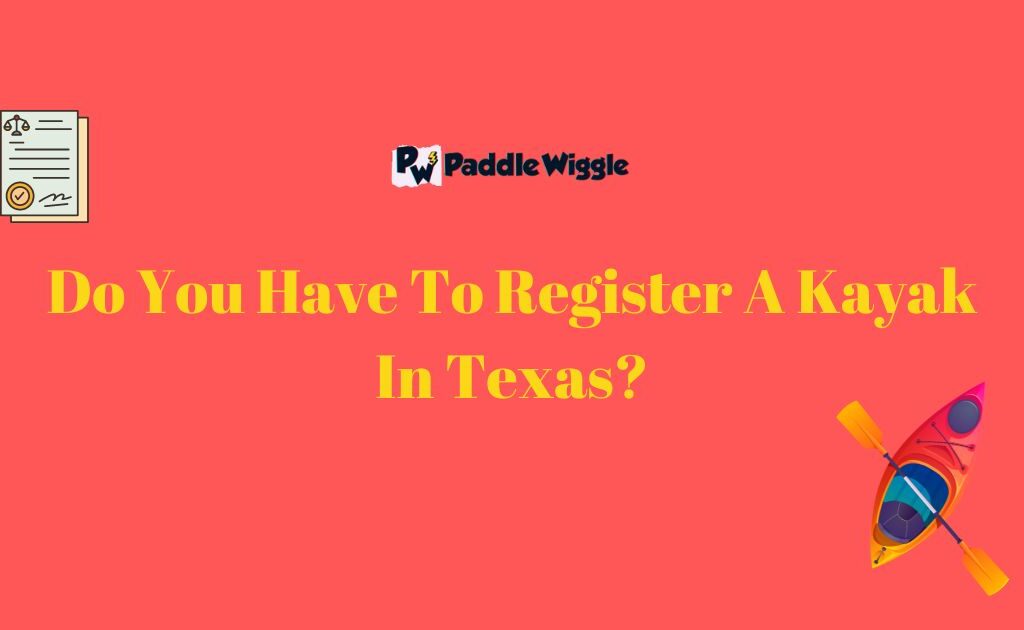Florida is known for its abundant alligator population, making encounters with these formidable creatures a real possibility when kayaking. Factors such as proximity to alligator habitats, unpredictable behavior, and human activities can increase the risk of an attack.
But do alligators attack kayaks in Florida? Is it safe to kayak in Florida with alligators? The good news is that alligators do not commonly attack kayaks in Florida. So, it’s safe to kayak around them.
When an alligator sees a kayak nearby, it might get a little curious. After all, we humans look strange to them floating on those colorful boats. But that curiosity is just that – curiosity. Alligators aren’t plotting kayak attacks in their spare time!
Alligators are like the locals in Florida’s waterways – they’ve been here for a long time. They share Florida’s beautiful waterways with us, and most of the time, they do their thing, and we do ours.
But when you’re out there, you should know what to do and how to avoid alligators from approaching your kayak. First off, it’s crucial to understand the behaviors of Floridan alligators. So, let’s dive deeper.
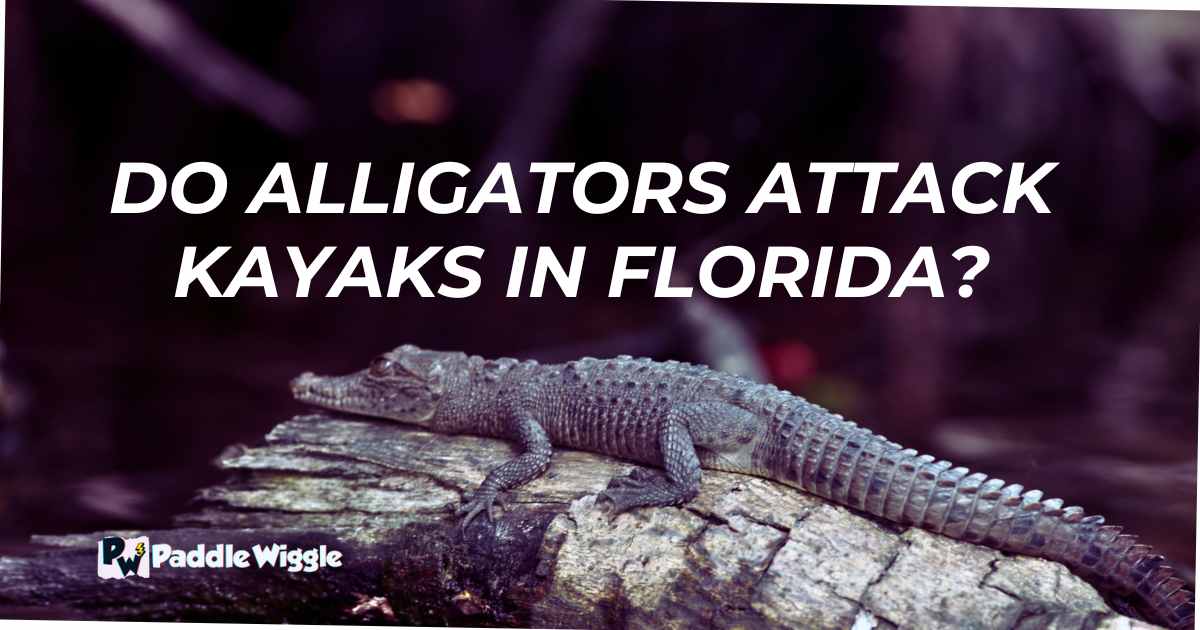
Instances of alligators attacking kayaks In Florida
Instances of alligators attacking kayaks are rare in Florida. Alligators generally do not view kayaks as prey or a threat. Most reported incidents involve human provocation or accidental encounters. Statistical data shows a low occurrence of kayak-alligator interactions.
- Yes, there have been cases where alligators attacked kayaks, but they are infrequent.
- Alligators typically do not perceive kayaks as potential food sources or enemies.
- Most reported incidents involve humans either provoking the alligator or unintentionally coming into proximity to them.
- It is important to note that these occurrences are statistically uncommon.
- Alligators primarily hunt for prey in the water, such as fish and small mammals, rather than targeting kayakers.
While it is possible for an alligator to approach a kayak out of curiosity or territorial behavior, their usual response is to retreat rather than attack.
Why Floridan alligators are not aggressive?
Alligators are like the wise elders of Florida’s waterways. Their ancient lineage stretches back through the annals of time. They share Florida’s stunning waterways with us.
Floridan Alligators have developed a natural instinct to be cautious and avoid unnecessary confrontations. Their primary response is to flee rather than attack humans or objects like kayaks. That’s why they are not aggressive in nature. However, this can be attributed to various factors.
Evolutionary Adaptation
Over time, alligators in Florida have evolved to prioritize self-preservation and minimize risk. They understand that engaging in aggressive behavior increases their chances of injury or death, so they tend to choose a more calm and non-confrontational approach.
Typical Food Habit
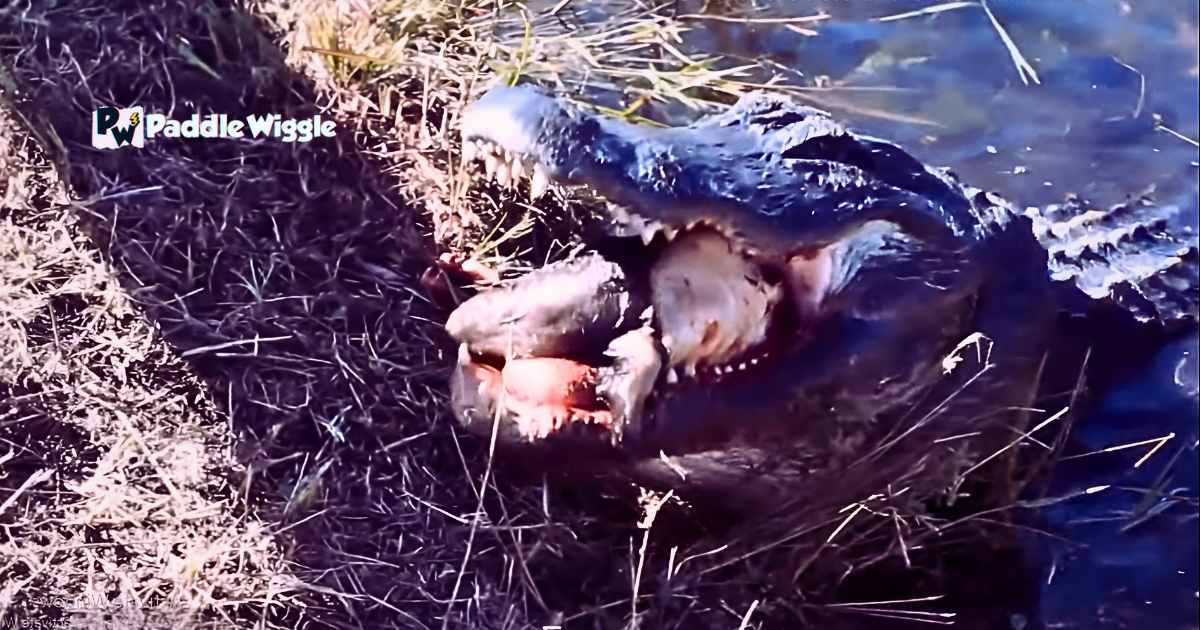

Floridan alligators primarily feed on fish, turtles, birds, and small mammals. These food sources are not always abundant, leading the alligators to conserve energy by avoiding unnecessary aggression. Since kayaks do not pose any threat or serve as potential prey, alligators see no reason to attack them.
Energy Conservation
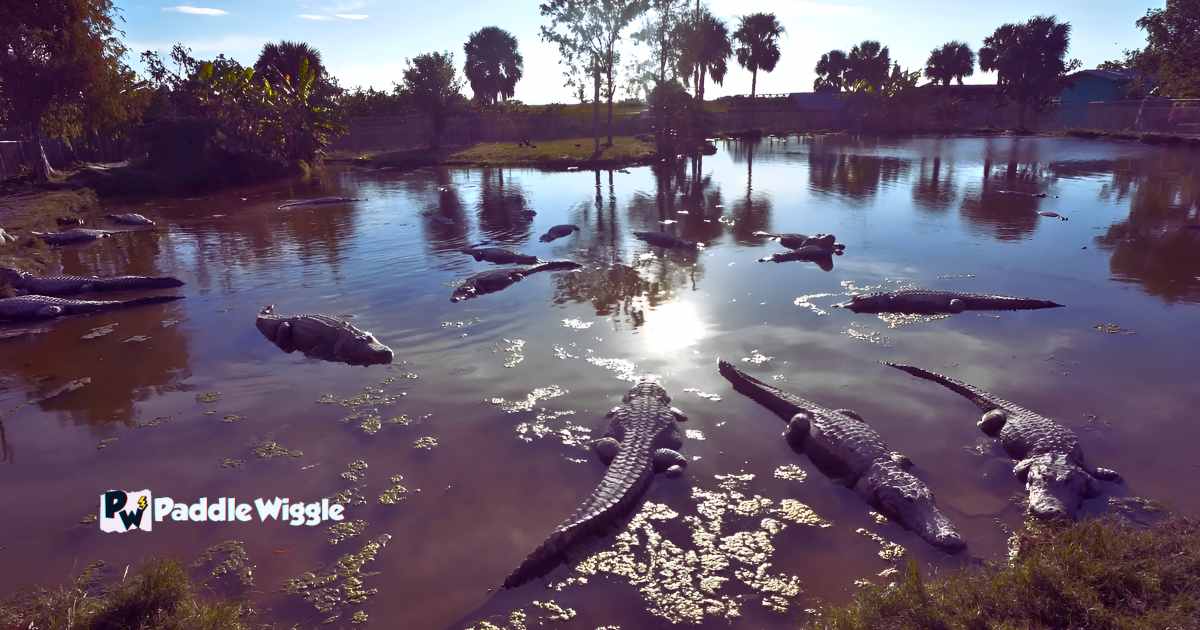

Alligator metabolism slows down during colder months when their food intake decreases significantly. To conserve energy during this period, they become even less inclined towards aggressive behavior unless absolutely necessary for survival.
Protective Laws and Conservation Efforts
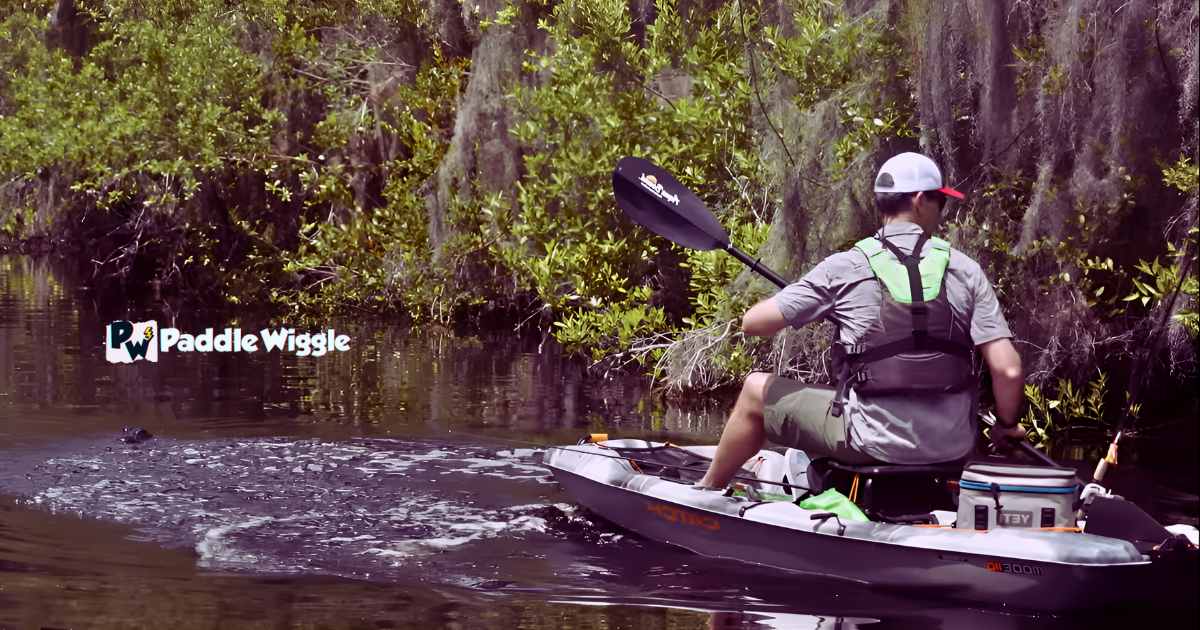

Implementing protective laws and conservation efforts has played a crucial role in maintaining peaceful coexistence between humans and alligators in Florida. These measures ensure that both parties respect each other’s space and reduce the likelihood of conflicts arising.
Typical Alligators in Florida: Their Nature And Behaviors
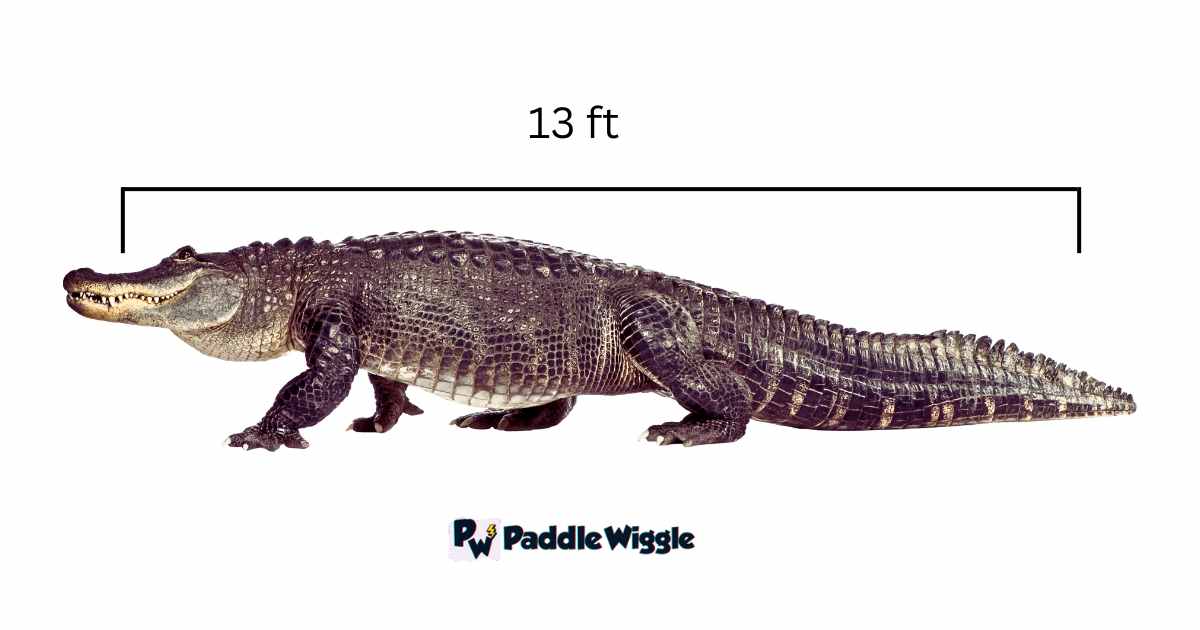

Florida is home to a diverse population of alligators, each with its unique characteristics and behaviors. Understanding their behavior patterns is crucial for anyone venturing into their natural habitat.
Size, Weight, And Lifespan Variations
Alligators in Florida exhibit significant size and weight variations. Adult males can be really big, up to 13 feet long, and weigh over 500 pounds. Females are usually smaller, measuring around 9 feet. These strong creatures can live a long time, some even up to 50 years or more, making them part of Florida’s water world for a very long time.
Feeding Habits and Hunting Techniques
As you glide peacefully on the water, remember that alligators are clever hunters. They eat fish, turtles, birds, and small animals. Sometimes, they can catch even larger prey when they get the chance. To avoid any problems, it’s best not to attract them with food and never put your hands or feet near them while kayaking. Let them do their hunting naturally, and that helps protect their usual behavior.
Seasonal Behaviors and Nesting
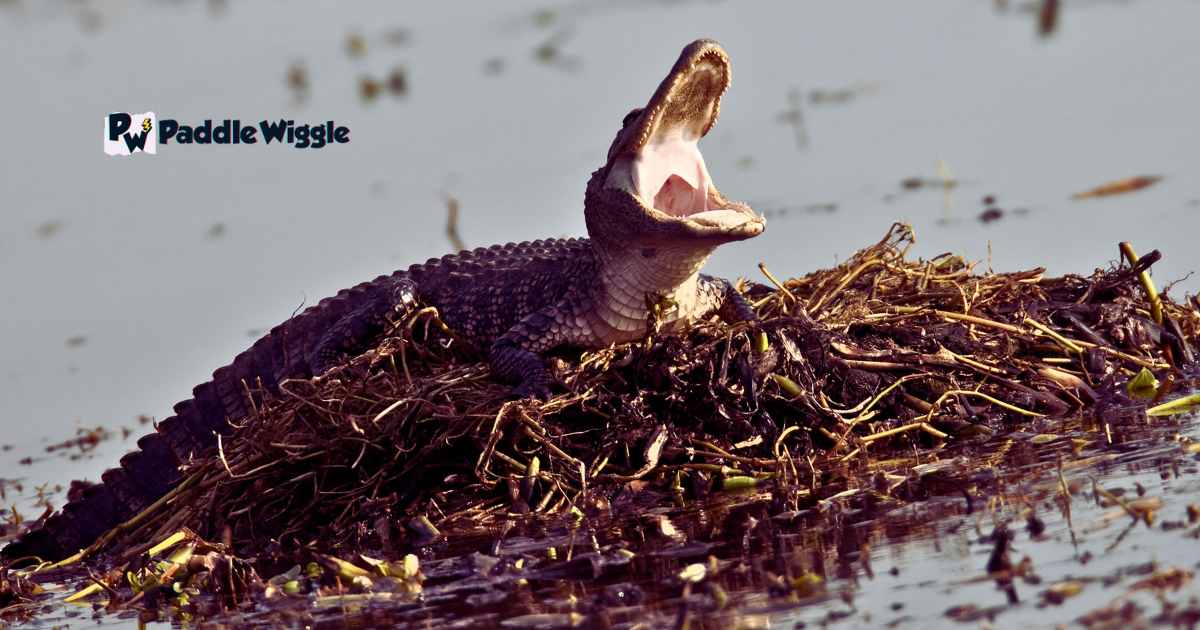

During your kayaking trips, you might notice that alligators have different behaviors at different times of the year. From April to June, male alligators show off to attract females during the mating season. Be careful during this time and give them space for their courtship.
Female alligators build nests near the water and take care of their eggs. When you see their nests, it’s best to keep your distance and not disturb them.
Understanding Territorial Instincts
As you paddle along, remember that alligators have their own space and like to protect it. They have territories they consider safe and theirs. Keep a distance from them, and avoid getting too close to their nesting areas or where they’re resting in the sun. You help them feel comfortable and protect their homes by giving them space.
4 Tips for Coexisting Safely During Kayak Around Alligators
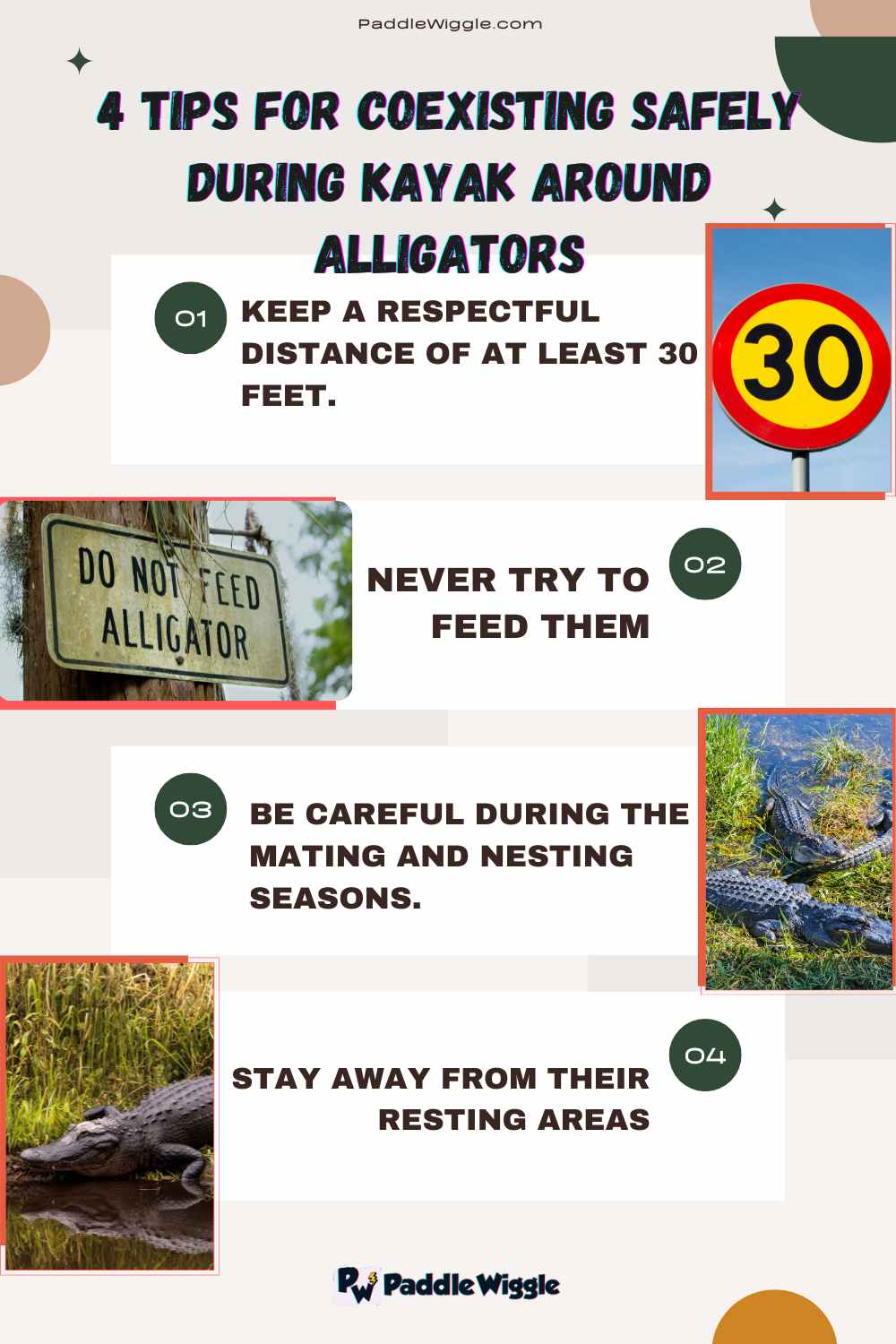

Alligators are native to Florida’s waterways. With their ancient allure, add a touch of wonder to your journey. To ensure a safe and memorable kayaking experience in the company of alligators, consider these four crucial tips:
- Keep a respectful distance from alligators, at least 30 feet or more.
- Don’t try to feed or get too close to alligators; it might change their behavior and be risky.
- Be careful during the mating and nesting seasons when they might be more protective.
- Stay away from their nests and resting areas to avoid causing stress or trouble.
Learn More
Are There Any Designated Areas Or Rules In Florida’s Waterways To Protect Both Alligators And Kayakers?
Yes, in Florida’s waterways, specific areas are marked for protection, and rules are in place to keep alligators and kayakers safe.
Parks and wildlife areas have signs with guidelines to follow. Kayakers should stick to these rules, which include keeping a safe distance from alligators, not feeding them, and respecting their natural behaviors.
Following these guidelines ensures safety for both kayakers and alligators while keeping the ecosystem balanced.
How Do Alligators View Kayakers And Other Human Activities In Their Habitat?
Alligators see kayakers and humans as possible dangers in their territory. They tend to stay away from people and watch from a distance. They focus on their survival and prefer not to come too close to humans.
How Can Kayakers Stay Safe During Their Adventures In Areas Inhabited By Alligators?
Kayakers can ensure their safety during adventures in areas inhabited by alligators by following some essential guidelines.
First and foremost, it is crucial to maintain a respectful distance from alligators, preferably at least 30 feet or more. This distance helps to minimize any potential interactions and reduces the chance of accidental encounters.
Check this article on How to Keep Alligators Away While Kayaking for a detailed guide.
What Actions Should Kayakers Avoid To Prevent Altering The Natural Behavior Of Alligators?
To keep alligators acting naturally and ensure safety, kayakers should avoid specific actions. First, never feed alligators because it might make them associate people with food, which can be risky. Second, stay away from alligator nests, as disturbing them can make the female alligator anxious and lead to aggressive behavior. Additionally, don’t try to touch or play with alligators, as they are wild animals, and it’s not safe to interact with them.
And respect alligators’ space and avoid getting too close to where they rest or stay, as it could make them feel threatened and react defensively.
Final Words
After going through their nature and behaviors, you can now paddle confidently, as they don’t usually attack kayaks. But remember, being responsible helps protect Florida’s beautiful wildlife and keeps a peaceful relationship between humans and alligators.


